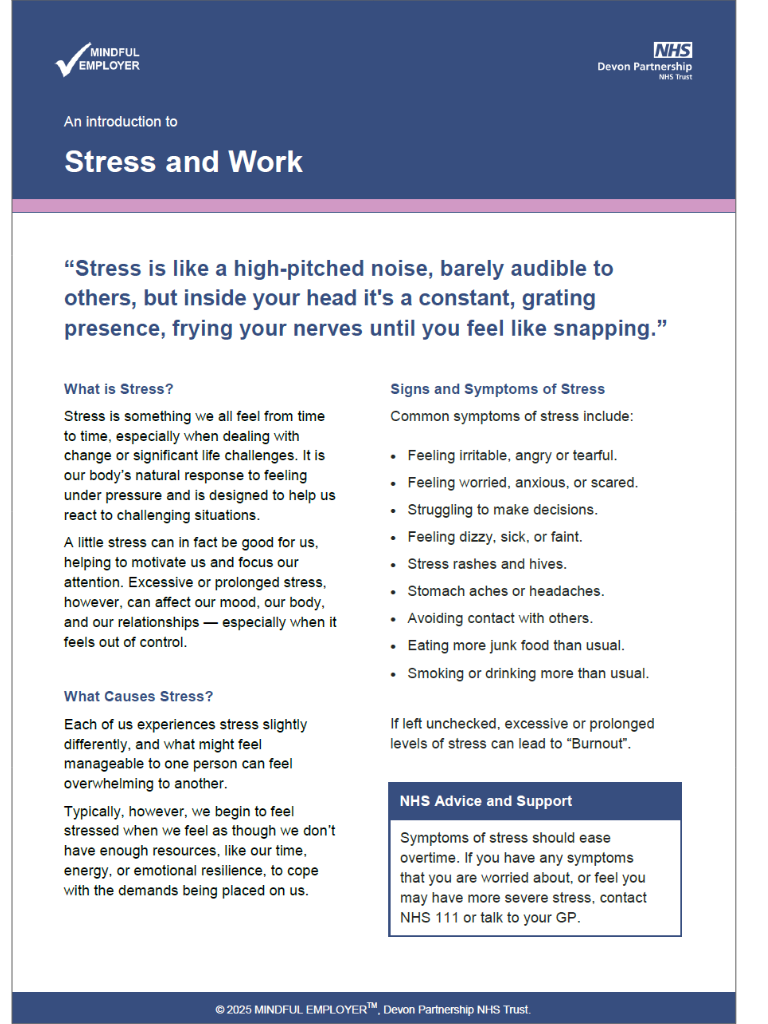Contents:
What is Stress? | What Causes Stress? | Signs and Symptoms of Stress | Work-Related Stress
“Stress is like a high-pitched noise, barely audible to others, but inside your head it's a constant, grating presence, frying your nerves until you feel like snapping.”
What is Stress?
Stress is something we all feel from time to time, especially when dealing with change or significant life challenges. It is our body’s natural response to feeling under pressure and is designed to help us react to challenging situations.
A little stress can in fact be good for us, helping to motivate us and focus our attention. Excessive or prolonged stress, however, can affect our mood, our body, and our relationships — especially when it feels out of control.
What Causes Stress?
IEach of us experiences stress slightly differently, and what might feel manageable to one person can feel overwhelming to another.
Typically, however, we begin to feel stressed when we feel as though we don’t have enough resources, like our time, energy, or emotional resilience, to cope with the demands being placed on us.
Signs and Symptoms of Stress
Common symptoms of stress include:
- Feeling irritable, angry, or tearful
- Feeling worried, anxious, or scared
- Struggling to make decisions
- Feeling dizzy, sick, or faint
- Stress rashes or hives
- Stomach aches or headaches
- Avoiding contact with others
- Eating more junk food than usual
- Smoking or drinking more than usual
If left unchecked, expressive or prolonged levels of stress can lead to "Burnout".
| If stress is affecting your everyday life, contact NHS 111 or talk to your GP.
Work-Related Stress
Whether it’s caused by tight deadlines, heavy workloads, or disagreements with colleagues, work-related stress has become one of the most common challenges we face.
When we feel stressed at work, we might struggle to focus on tasks, make decisions, or maintain good relationships with others. Over time, this can affect our job satisfaction and overall performance. While we’re not always able to control the causes of stress in our lives, we can reduce their impact by changing how we respond to them. To do this, we can try:
- Scheduling Short Breaks
When we’re feeling stressed, it can be all too tempting to ‘push through’ our work. However, this approach often leaves us feeling exhausted in the long run, making it harder to stay productive. Taking a break away from our desk, even if only for ten minutes, can make a big difference in reducing stress and boosting our focus. - Making Time for What Matters
Often, the first things to go when we’re feeling stressed are the hobbies and good habits that help us feel our best. However, when we push aside the things that we value and enjoy from our lives, we end up with little more than our stress. Scheduling time for these activities, even in small ways, can help us to recharge our batteries and rebuild our resilience. - Getting our Steps In
When we feel stressed, our body releases adrenaline, which can leave us feeling tense and on edge. Walking is a simple yet effective way to release some of this built-up energy. Whether it’s a short walk on your lunch break, taking the stairs instead of the lift, or pacing while on a call, getting more steps in throughout the day can help clear your mind and improve focus. - Starting off Small
Long to-do lists and competing priorities can often leave us feeling overwhelmed. One way we can regain a sense of control is to start each day by checking off those tasks which take just a few minutes to complete. For larger tasks, we can try breaking them down into smaller, more manageable chunks.
Above all, it’s important to remember that you’re not alone. If you’re struggling with feelings of stress, reach out to a trusted colleague or manager for support. Alternatively, you may have access to an employee assistance program or wellbeing champion who can offer further advice.


